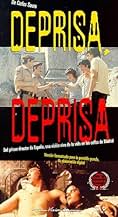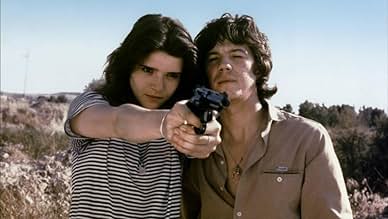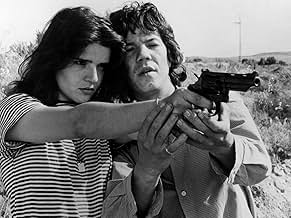VALUTAZIONE IMDb
7,0/10
1904
LA TUA VALUTAZIONE
Aggiungi una trama nella tua linguaAngela begins to hang around with Pablo and his gang of young robbers.Angela begins to hang around with Pablo and his gang of young robbers.Angela begins to hang around with Pablo and his gang of young robbers.
- Premi
- 1 vittoria e 1 candidatura in totale
Berta Socuéllamos
- Ángela
- (as Berta Socuellamos)
Jose Antonio Valdelomar González
- Pablo
- (as Jose Antonio Valdelomar)
Jesús Arias
- Meca
- (as Jesus Arias)
José María Hervás Roldán
- Sebas
- (as Jose Mª Hervas)
María del Mar Serrano
- María
- (as Maria del Mar Serrano)
André Falcon
- Cajero
- (as Andre Falcon)
Yves Barsacq
- Luis
- (as Ives Barsacq)
Joaquín Escola
- Doctor
- (as Joaquin Escola)
Matías Prats
- Locutor
- (as Matias Prats)
Trama
Lo sapevi?
- QuizJose Antonio Valdelomar González (Pablo) was recruited by Carlos Saura in a casting for non-professional actors. He was paid US$3,000. In 1992 he was found dead of a heroin overdose at Carabanchel prison (Madrid), where he was arrested for robbing a bank.
- ConnessioniFeatured in Caso cerrado (1985)
Recensione in evidenza
This film made such a deep impression upon me that I was sure to view it a second time before it disappeared from tcm "on demand" for an indefinite period of time. Who knows for how long? I may even watch it a third time before its one week run expires at midnight tonight.
In some ways, this film reminds me of notable American films depicting crime sprees, such as "Badlands" or "Gun Crazy", but it is uniquely Spanish in nature and truly stands on its own as a distinctive work of art. Carlos Saura, a director with whom I was totally unfamiliar before a recent tcm double feature of two of his films, is to be commended for an outstanding film that captures a very special atmosphere and tone.
I travelled in Spain, including Madrid, for a month at the end of 1971 when Francisco Franco still ruled the country with a strong arm, including an intricate network of secret police that was not unlike totalitarian regimes everywhere else throughout history. It is very significant that this film was produced after the death of Franco because the Spain that is depicted in this movie seems like a very different country than the Spain that I visited in 1971. While the police in the film are tough enough, they were most likely a much more formidable force during Franco's iron rule.
The use by Saura of the speeding trains outside the balcony of the flat used by the gang as its headquarters is brilliant as they symbolize a society that doesn't even pause for a moment to consider the existence of this totally alienated group until it draws attention to itself by breaking the law, sometimes in extremely violent ways. I could have been riding on one of those trains as a foreign tourist, totally unaware of the existence of this element as it was kicked to the curb of Spanish civilization. Note the shocked, disgusted reaction of the two older, established women when they are suddenly confronted by the disrespect displayed by the delinquent group at the holy site.
The strong flamenco influence of the gypsy rumba music played in the background throughout the film also creates a uniquely delicious Spanish flavor to the film. The musical score powerfully contributes to the overall impact, which is no less than magical and hypnotic for me. The use of amateur actors is another stroke of genius by the director as it makes the action all the more real and believable, not unlike the post World War II Italian films of Vittorio De Sica which I also love.
Did anyone expect the "respectable" doctor to return, as he had promised, after he took Angela's money? And what was to become of Angela after she walked into the darkness at the end? I very much wanted to know. From the very start, the genius of Carlos Saura sustained my interest and involvement to the bitter end. This is a great and much under-rated movie!
In some ways, this film reminds me of notable American films depicting crime sprees, such as "Badlands" or "Gun Crazy", but it is uniquely Spanish in nature and truly stands on its own as a distinctive work of art. Carlos Saura, a director with whom I was totally unfamiliar before a recent tcm double feature of two of his films, is to be commended for an outstanding film that captures a very special atmosphere and tone.
I travelled in Spain, including Madrid, for a month at the end of 1971 when Francisco Franco still ruled the country with a strong arm, including an intricate network of secret police that was not unlike totalitarian regimes everywhere else throughout history. It is very significant that this film was produced after the death of Franco because the Spain that is depicted in this movie seems like a very different country than the Spain that I visited in 1971. While the police in the film are tough enough, they were most likely a much more formidable force during Franco's iron rule.
The use by Saura of the speeding trains outside the balcony of the flat used by the gang as its headquarters is brilliant as they symbolize a society that doesn't even pause for a moment to consider the existence of this totally alienated group until it draws attention to itself by breaking the law, sometimes in extremely violent ways. I could have been riding on one of those trains as a foreign tourist, totally unaware of the existence of this element as it was kicked to the curb of Spanish civilization. Note the shocked, disgusted reaction of the two older, established women when they are suddenly confronted by the disrespect displayed by the delinquent group at the holy site.
The strong flamenco influence of the gypsy rumba music played in the background throughout the film also creates a uniquely delicious Spanish flavor to the film. The musical score powerfully contributes to the overall impact, which is no less than magical and hypnotic for me. The use of amateur actors is another stroke of genius by the director as it makes the action all the more real and believable, not unlike the post World War II Italian films of Vittorio De Sica which I also love.
Did anyone expect the "respectable" doctor to return, as he had promised, after he took Angela's money? And what was to become of Angela after she walked into the darkness at the end? I very much wanted to know. From the very start, the genius of Carlos Saura sustained my interest and involvement to the bitter end. This is a great and much under-rated movie!
- frankwiener
- 8 lug 2019
- Permalink
I più visti
Accedi per valutare e creare un elenco di titoli salvati per ottenere consigli personalizzati
- How long is Deprisa, Deprisa?Powered by Alexa
Dettagli
- Data di uscita
- Paesi di origine
- Sito ufficiale
- Lingua
- Celebre anche come
- Deprisa, Deprisa
- Luoghi delle riprese
- Los Escullos, Níjar, Almería, Andalucía, Spagna(Beach exterior scene)
- Aziende produttrici
- Vedi altri crediti dell’azienda su IMDbPro
Botteghino
- Budget
- 36.000.000 ESP (previsto)
- Lordo in tutto il mondo
- 632 USD
Contribuisci a questa pagina
Suggerisci una modifica o aggiungi i contenuti mancanti

Divario superiore
By what name was In fretta, in fretta (1981) officially released in Canada in English?
Rispondi
![Guarda Trailer [OV]](https://m.media-amazon.com/images/M/MV5BNmFmMTIwM2QtZTQ3Ny00MTBkLWIzOWYtZjUzMDkzYTQzOTdlXkEyXkFqcGdeQXRyYW5zY29kZS13b3JrZmxvdw@@._V1_QL75_UX500_CR0)

















